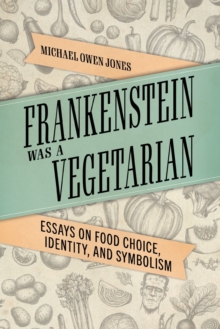Description
| Product ID: | 9781496839947 |
| Product Form: | Paperback / softback |
| Country of Manufacture: | GB |
| Title: | Frankenstein Was a Vegetarian |
| Subtitle: | Essays on Food Choice, Identity, and Symbolism |
| Authors: | Author: Michael Owen Jones |
| Page Count: | 258 |
| Subjects: | Cultural studies: food and society, Food & society, Folklore studies / Study of myth (mythology), Social and cultural anthropology, Public administration, Folklore, myths & legends, Social & cultural anthropology, ethnography, Public administration |
| Description: | Tackles topics often overlooked in foodways. Michael Owen Jones explains how we communicate through what we eat, the connection between food choice and who we are or want to appear to be, the ways that many of us self-medicate moods with foods, and the nature of disgust. In Frankenstein Was a Vegetarian: Essays on Food Choice, Identity, and Symbolism, Michael Owen Jones tackles topics often overlooked in foodways. At the outset he notes it was Victor Frankenstein''s "daemon" in Mary Shelley''s novel that advocated vegetarianism, not the scientist whose name has long been attributed to his creature. Jones explains how we communicate through what we eat, the connection between food choice and who we are or want to appear to be, the ways that many of us self-medicate moods with foods, and the nature of disgust. He presents fascinating case studies of religious bigotry and political machinations triggered by rumored bans on pork, the last meal requests of prisoners about to be executed, and the Utopian vision of Percy Bysshe Shelley, one of England''s greatest poets, that was based on a vegetable diet like the creature''s meals in Frankenstein.Jones also scrutinizes how food is used and abused on the campaign trail, how gender issues arise when food meets politics, and how eating preferences reflect the personalities and values of politicians, one of whom was elected president and then impeached twice. Throughout the book, Jones deals with food as symbol as well as analyzes the link between food choice and multiple identities. Aesthetics, morality, and politics likewise loom large in his inquiries. In the final two chapters, Jones applies these concepts to overhauling penal policies and practices that make food part of the pains of imprisonment, and looks at transforming the counseling of diabetes patients, who number in the millions. |
| Imprint Name: | University Press of Mississippi |
| Publisher Name: | University Press of Mississippi |
| Country of Publication: | GB |
| Publishing Date: | 2022-06-27 |


